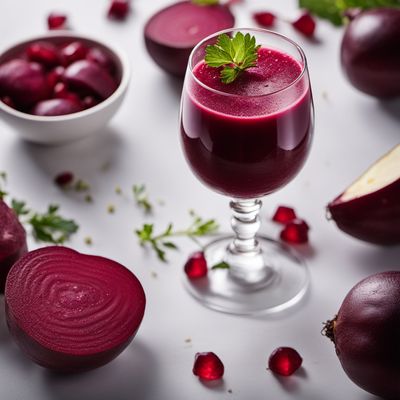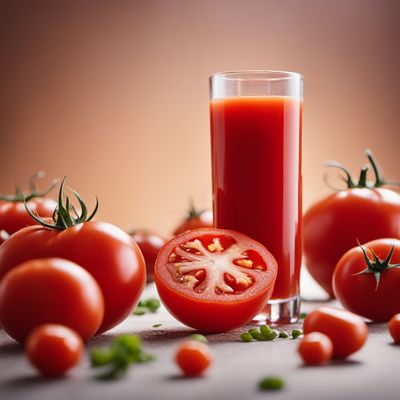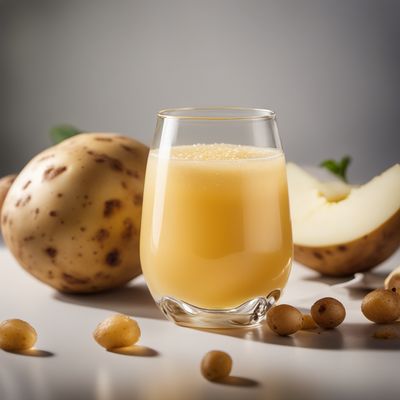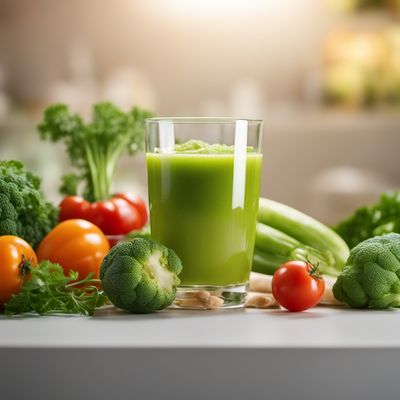
Ingredient
Juice, carrot
The Golden Elixir: Carrot Juice
Carrot juice is made by extracting the liquid from fresh carrots, resulting in a smooth and slightly sweet drink. It has a vibrant orange color and a refreshing taste. Carrot juice is rich in vitamins A, C, and K, as well as antioxidants and minerals like potassium and manganese.
Origins and history
Carrots are believed to have originated in Central Asia thousands of years ago. They were initially cultivated for their aromatic leaves and seeds, rather than their roots. Over time, selective breeding led to the development of larger and sweeter carrots, which eventually became the carrots we know today. Carrot juice gained popularity in the early 20th century as a health tonic and has since become a staple in many juice bars and health-conscious households.
Nutritional information
Carrot juice is a nutrient-dense beverage that provides a good amount of vitamins A, C, and K. It is also a good source of antioxidants, which help protect the body against oxidative stress. Additionally, carrot juice is low in calories and fat, making it a healthy choice for those watching their weight.
Allergens
Carrot juice may cause allergic reactions in individuals with a known allergy to carrots. It is also high in natural sugars, so individuals with diabetes or those following a low-sugar diet should consume it in moderation.
How to select
When selecting carrot juice, opt for fresh, cold-pressed varieties that are free from additives or preservatives. Look for juices that have a vibrant orange color and a smooth consistency. It is also important to check the expiration date and ensure that the juice is stored in a refrigerated section of the store.
Storage recommendations
To maintain its freshness and nutritional value, carrot juice should be stored in a tightly sealed container in the refrigerator. It is best consumed within 2-3 days of juicing to ensure optimal flavor and quality.
How to produce
Carrot juice can be produced at home by juicing fresh carrots using a juicer or a blender. Simply wash and peel the carrots, cut them into smaller pieces, and blend or juice until smooth. Strain the juice to remove any pulp or fiber, if desired. Homemade carrot juice should be consumed immediately or stored in the refrigerator for up to 2-3 days.
Preparation tips
Carrot juice can be enjoyed on its own as a refreshing beverage or used as a base for smoothies, cocktails, or mocktails. It can also be added to soups, sauces, or salad dressings to enhance their flavor and nutritional content. Additionally, carrot juice can be used as a natural food coloring in baked goods or desserts.
Culinary uses
Carrot juice is commonly used in smoothies, juices, cocktails, and mocktails. It is also a popular ingredient in carrot cake, muffins, and other baked goods. In savory dishes, carrot juice can be used to add flavor and color to soups, sauces, or marinades.
Availability
Carrot juice is widely available in supermarkets, grocery stores, and health food stores around the world. It is particularly popular in countries like the United States, United Kingdom, Australia, and India.
More ingredients from this category

Juice, turnip
"The Nutrient-Packed Elixir: Unleashing the Power of Turnip Juice"

Juice, cucumber
The Refreshing Elixir: Cucumber Juice

Juice, white cabbage
Cabbage Elixir

Juice, beetroot
The Vibrant Elixir

Juice, tomato
The Tangy Elixir

Juice, potato
The Versatile Elixir: Unleashing the Power of Potato Juice

Juice, celery
"The Green Elixir: Unleashing the Power of Celery Juice"

Mixed vegetable juice
The Nutrient-Packed Elixir